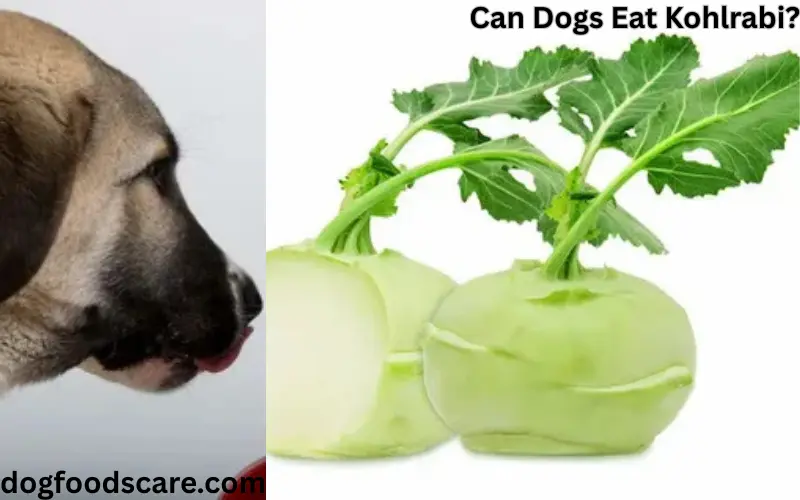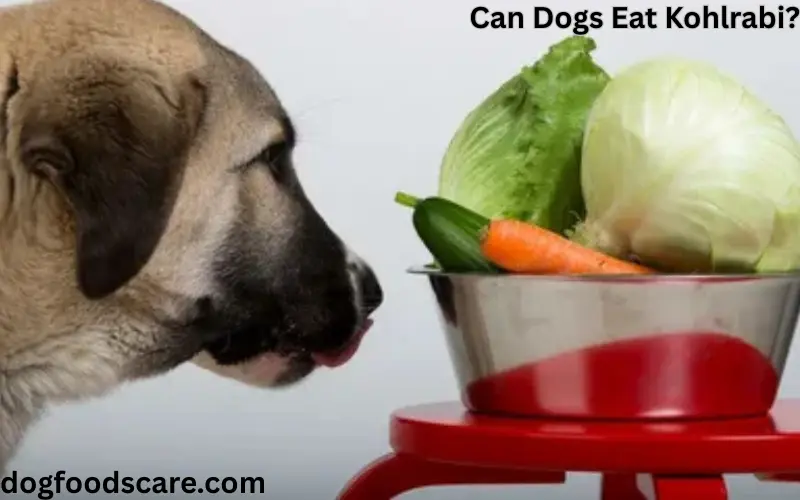“Can Dogs Eat Kohlrabi?” Yes, kohlrabi is not toxic to dogs; you can offer it to your dog as a snack in moderation whenever you want. Since kohlrabi is not a suitable food for dogs, its regular consumption can have adverse effects on their health.
Before offering kohlrabi to dogs, be sure to read our article once, so that you can know valuable information about kohlrabi. Let’s explore the benefits of kohlrabi for dogs.
Can Dogs Eat Kohlrabi?
Yes, suppose you plan to offer kohlrabi to your dogs. In that case, you can feed it without hesitation, as kohlrabi naturally contains many beneficial vitamins and minerals, making it an excellent source for your dog’s health.
Dogs can be fed kohlrabi, but in moderation, as kohlrabi is not a staple food for canines, so consuming it in large quantities can be detrimental to their health.
It is okay to offer dogs one or half of a kohlrabi daily as an occasional snack.
Are Raw Kohlrabi Safe For Dogs To Eat?
Sometimes, dogs go to the fields and eat large amounts of raw kohlrabi, which can cause them to suffer from stomachaches and digestive problems.
Try to keep your dogs under control so that they do not eat any harmful items while roaming around.
Even if a dog eats a large amount of raw kohlrabi, keep an eye on the adverse effects on its health. If any danger signs appear, consult a doctor immediately to avoid serious harm.
Can My Dogs Also Eat Kohlrabi Leaves?
Yes, kohlrabi leaves are rich in vitamins A and K, which provide your dog with essential calcium and minerals, which are necessary for good health.
While preparing kohlrabi, the leaves are often removed and discarded, so instead of wasting them, feed those same leaves to your dog to get vitamins A and K.

How Much Kohlrabi Is Beneficial For Dog Health?
Kohlrabi can be beneficial for dogs when consumed in moderation, as it contains essential vitamins and minerals, making it an excellent addition to your dog’s diet for optimal health.
Feeding kohlrabi gives dogs a new treat that they enjoy eating, as they are tired of commercial foods and insist on eating green vegetables.
Is Kohlrabi Toxic to Dogs?
No, since kohlrabi is used as a vegetable, it is not toxic and is safe for your dog.
Although kohlrabi is not toxic to dogs, consuming excessive amounts of it can be hazardous to their health. Large amounts of kohlrabi can affect a dog’s digestive system, potentially causing various stomach problems.
How To Safely Prepare Kohlrabi For Your Dogs?
Before feeding kohlrabi to dogs, they should be prepared well.
First, go to the market or your farm and select a clean kohlrabi. Wash it thoroughly with clean water.
Cut the kohlrabi into small pieces so that the dog does not have any difficulty swallowing.
Instead of giving kohlrabi leaves to dogs, feed them to them because kohlrabi leaves contain many valuable minerals and vitamins.
Use in moderation to support successful digestion, thereby protecting your dog from stomach problems.

FAQS About Kohlrabi
Q1: Is Kohlrabi Safe For Small Dogs?
ANS: Small dogs can enjoy small kohlrabi leaves in small quantities.
Q2: How To Safely Feed Kohlrabi To Dogs?
ANS: Half a piece of kohlrabi once a day is considered safe for dogs.
Q3: Is Kohlrabi Harmful For Dogs?
ANS: Kohlrabi is a human vegetable, which is widely consumed in the United States, so it can never be harmful to dogs or humans.
Q4: Can My Dogs Eat Vegetable Kohlrabi Every Day?
ANS: No, your dog cannot consume kohlrabi continuously, as it can cause digestive problems.
Q5: What Side Effects Can Dogs Experience From Eating Kohlrabi?
ANS: To date, I have not heard from any canine owners that kohlrabi can pose a risk of side effects for dogs. It is a safe and usable vegetable.
Conclusion
Can Dogs Eat Kohlrabi? Yes, dogs can be given kohlrabi in moderation, as the green leaves of kohlrabi contain many beneficial vitamins and minerals that promote good health in dogs. However, excessive consumption of them can cause various problems in dogs, such as stomach aches, indigestion, and intestinal disorders.
When feeding kohlrabi to dogs, it should be cut into small pieces first so that small dogs do not have difficulty eating it.
